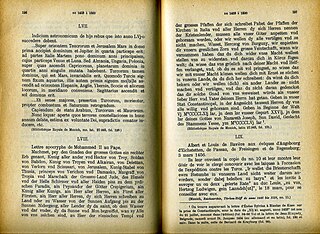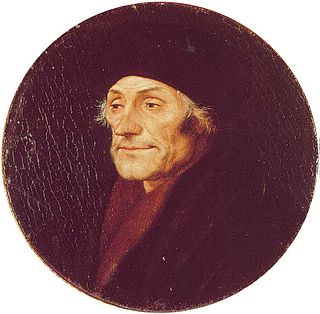Related Research Articles

Apocrypha are biblical or related writings not forming part of the accepted canon of Scripture. While some might be of doubtful authorship or authenticity, in Christianity, the word apocryphal (ἀπόκρυφος) was first applied to writings which were to be read privately rather than in the public context of church services. Apocrypha were edifying Christian works that were not considered canonical Scripture. It was not until well after the Protestant Reformation that the word apocrypha was used by some ecclesiastics to mean "false," "spurious," "bad," or "heretical."
The deuterocanonical books are books and passages considered by the Catholic Church, the Eastern Orthodox Church, the Oriental Orthodox Churches, and/or the Assyrian Church of the East to be canonical books of the Old Testament, but which Jews and Protestants regard as apocrypha. They date from 300 BC to 100 AD, before the separation of the Christian church from Judaism. While the New Testament never directly quotes from or names these books, the apostles quoted the Septuagint, which includes them. Some say there is a correspondence of thought, and others see texts from these books being paraphrased, referred, or alluded to many times in the New Testament, depending in large measure on what is counted as a reference.

Desiderius Erasmus Roterodamus was a Dutch Christian humanist, Catholic theologian, educationalist, satirist and philosopher. Through his vast number of translations, books, essays, prayers and letters, he is considered one of the most influential thinkers of the Northern Renaissance and one of the major figures of Dutch and Western culture.
Sola scriptura is a Christian theological doctrine held by most Protestant Christian denominations, in particular the Lutheran and Reformed traditions, that posits the Bible as the sole infallible source of authority for Christian faith and practice. The Catholic Church considers it heterodox and generally the Orthodox churches consider it to be contrary to the phronema of the Church.

Renaissance humanism was a worldview centered on the nature and importance of humanity, that emerged from the study of Classical antiquity. This first began in Italy and then spread across Western Europe in the 14th, 15th, and 16th centuries. During the period, the term humanist referred to teachers and students of the humanities, known as the studia humanitatis, which included the study of Latin and Ancient Greek literatures, grammar, rhetoric, history, poetry, and moral philosophy. It was not until the 19th century that this began to be called humanism instead of the original humanities, and later by the retronym Renaissance humanism to distinguish it from later humanist developments. During the Renaissance period most humanists were Christians, so their concern was to "purify and renew Christianity", not to do away with it. Their vision was to return ad fontes to the simplicity of the Gospels and of the New Testament, bypassing the complexities of medieval Christian theology.
The Johannine Comma is an allegedly interpolated phrase (comma) in verses 5:7–8 of the First Epistle of John.

Christian humanism regards humanist principles like universal human dignity, individual freedom, and the importance of happiness as essential and principal or even exclusive components of the teachings of Jesus. Proponents of the term trace the concept to the Renaissance or patristic period, linking their beliefs to the scholarly movement also called 'humanism'.

The Collegium Trilingue, often also called Collegium trium linguarum, or, after its creator Collegium Buslidianum, is a university that was founded in 1517 under the patronage of the humanist, Hieronymus van Busleyden. The three languages taught were Latin, Greek and Hebrew. It was the model for the Collège de France founded in 1530. It is located in Leuven, Belgium.
(Divine) Accommodation is the theological principle that God, while being in His nature unknowable and unreachable, has nevertheless communicated with humanity in a way that humans can understand and to which they can respond, pre-eminently by the incarnation of Christ and similarly, for example, in the Bible.

On the Bondage of the Will by Martin Luther argued that people can achieve salvation or redemption only through God, and could not choose between good and evil through their own willpower. It was published in December 1525. It was his reply to Desiderius Erasmus' De libero arbitrio diatribe sive collatio or On Free Will, which had appeared in September 1524 as Erasmus' first public attack on some of Luther's ideas.

Humanism in France found its way from Italy, but did not become a distinct movement until the 16th century was well on its way.
Renaissance humanism came much later to Germany and Northern Europe in general than to Italy, and when it did, it encountered some resistance from the scholastic theology which reigned at the universities. Humanism may be dated from the invention of the printing press about 1450. Its flourishing period began at the close of the 15th century and lasted only until about 1520, when it was absorbed by the more popular and powerful religious movement, the Reformation, as Italian humanism was superseded by the papal counter-Reformation.
Ecclesiastes: On the Art of Preaching was a 1535 book by Desiderius Erasmus. One of the last major works he produced, Ecclesiastes focuses on the subject of effective preaching. Previously, Erasmus had written treatises on the Christian layperson, Christian prince, and Christian educator. Friends and admirers, including Bishop John Fisher suggested that Erasmus write on the office of the Christian priesthood. He began writing the text in 1523, finally completing and printing Ecclesiastes in 1535.
Lutheran orthodoxy was an era in the history of Lutheranism, which began in 1580 from the writing of the Book of Concord and ended at the Age of Enlightenment. Lutheran orthodoxy was paralleled by similar eras in Calvinism and tridentine Roman Catholicism after the Counter-Reformation.

The Tyndale Bible (TYN) generally refers to the body of biblical translations by William Tyndale into Early Modern English, made c. 1522–1535. Tyndale's Bible is credited with being the first Bible translation in the English language to work directly from Hebrew and Greek texts, although it relied heavily upon the Latin Vulgate. Furthermore, it was the first English biblical translation that was mass-produced as a result of new advances in the art of printing.
Error: no inner hatnotes detected (help).

Novum Instrumentum Omne, later called Novum Testamentum Omne, was a bilingual Latin-Greek New Testament with substantial scholarly annotations, and the first printed New Testament of the Greek to be published. It was prepared by Desiderius Erasmus (1466–1536) and printed by Johann Froben (1460–1527) of Basel.
A biblical canon is a set of texts which a particular Jewish or Christian religious community regards as part of the Bible.
Diego López de Zúñiga, Latin: Jacobus Lopis Stunica was a Spanish humanist and biblical scholar noted for his controversies with Erasmus and Lefèvre d'Etaples and leadership of the team of editors for the Complutensian Polyglot Bible. He was born around 1470 in Extremadura, to an aristocratic family; his brother Juan de Zúñiga was a diplomat for Charles V of Spain.

Sicut cervus is a motet for four voices by Giovanni Pierluigi da Palestrina. It sets the beginning of Psalm 42, Psalmus XLI in the Latin version of the Psalterium Romanum rather than the Vulgate Bible. The incipit is "Sicut cervus desiderat ad fontes" followed by a second part "Sitivit anima mea". It was published in 1604 in Motecta festorum, Liber 2, and has become one of Palestrina's most popular motets, regarded as a model of Renaissance polyphony, expressing spiritual yearning.
References
- ↑ "William Whitaker's Words". www.archives.nd.edu. Retrieved 11 December 2017.
- ↑ "The fundamental feature of Renaissance Humanism is summed up in the concept of ad fontes. It was believed that by studying the original texts whether, classical or Biblical, that there could be an actualization of the events described." "The differences between Erasmus and Luther in their aprroach to reform". Justification by faith. Archived from the original on 2007-02-07. Retrieved 2007-02-13.
- ↑ According to Hans-Georg Gadamer ( Truth and Method , p.502 of the 1989 revised English translation) there is evidence provided by E. Lledo that Spanish humanists drew the expression from this source.
- ↑ Latin Vulgate Bible, Book Of Psalms Psalm 41
- 1 2 "On the method of study and reading and interpreting authors." Erasmus von Rotterdam: De ratione studii ac legendi interpretandique auctores, Paris 1511, in: Desiderii Erasmi Roterodami Opera omnia, ed. J. H. Waszink u. a., Amsterdam 1971, Vol. I 2, 79-151.
- ↑ "Luther and Melanchthon saw theological development as deviation from the purity to be found only and without alteration in Paul, as understood by Luther." Decock, Paul Bernard (16 October 2019). "Erasmus as Reformer: Humanism and Piety—Scholarship and Tolerance". Studia Historiae Ecclesiasticae. 45 (2). doi: 10.25159/2412-4265/6735 .
- ↑ Lane, Jason D. (19 January 2016). "Luther's Criticism of James as a Key to his Biblical Hermeneutic". Auslegung und Hermeneutik der Bibel in der Reformationszeit. doi: 10.1515/9783110467925-006 .
- ↑ Peeren, Esther (2021). "Suspicious Minds". In Thiele; Kaiser; O'Leary (eds.). The ends of critique: methods, institutions, politics (PDF). Lanham: Rowman & Littlefield. ISBN 9781786616463.
- ↑ Chesterton, Gilbert Keith (1933). St. Thomas Aquinas.
- ↑ Newman, John Henry (1909). An Essay on the Development of Christian Doctrine, by John Henry Cardinal Newman (14th impression ed.). London: Longmans, Green, and Co. Retrieved 16 December 2023.
- ↑ Rummel, Erika (1992). "Et cum theologo bella poeta gerit: The Conflict between Humanists and Scholastics Revisited". The Sixteenth Century Journal. 23 (4): 713–726. doi:10.2307/2541729. ISSN 0361-0160.